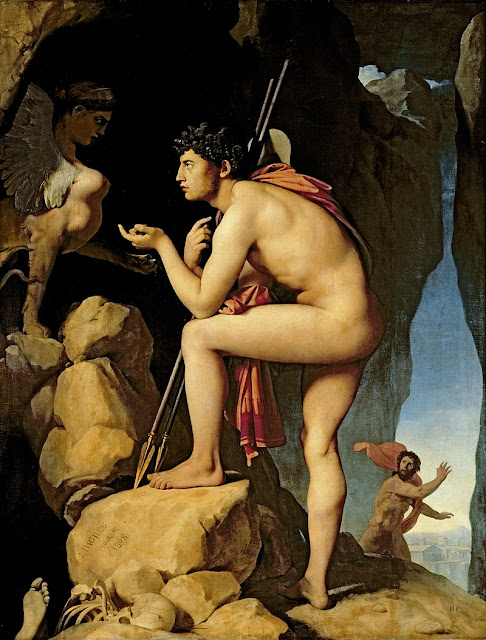This post is the first in a series on the
epiphany in writing. In fiction, epiphany can come through exposition, characterization, dialogue, or plot. An epiphany is a moment when disparate threads come together and the character and audience or reader learn the truth. Epiphanies pull the veils from our eyes. They decode unexplained jokes, mysteries, betrayals and destinies.
The Epiphany as Personal Choice
James Joyce (1882-1941) first used '
epiphany,' a religious term, to apply to literature, although the most famous moment of epiphany probably comes from
Sophocles' classical
story of Oedipus,
Oedipus the King (
Oedipus Rex), dated 429 BCE. Oedipus is a cursed character who moves blindly through his life, surrounded by lies and subterfuge.
Epiphanies are foreshadowed by a character's encounter with something alien and surprising, a divine gift, granted in an unexpected way. A critical moment in Oedipus's journey arises during his encounter with the Grecian
Sphinx that guards the crossroads between
Delphi and
Thebes. It seems that his encounter with the Sphinx might offer him a path away from his tragic fate, if only he could understand what she is trying to teach him with her riddles.
In Sophocles' version of the myth, Oedipus answers the Sphinx's
riddle. Confounded, the
monster throws herself off a cliff and Oedipus rids the Thebans of the Sphinx's cursed presence. He also wins the hand of the Theban queen,
Jocasta, who - unknown to him - is his mother.
In a modern French retelling, entitled
The Infernal Machine (
La Machine infernale, 1934), author
Jean Cocteau (1889-1963) refined the romantic dynamic of the story so that Oedipus's sexual challenges became clearer. The Sphinx falls in love with Oedipus and divulges the answers to her riddle prior to asking it. She wants to seduce him in order that she can stop killing passersby, and thereby escape her own cursed fate.
Having been given the answer by the Sphinx, our hero easily solves her subsequently-posed riddle, and he thoughtlessly
brings about her death. Oedipus is a thankless student, oblivious to the gift of wisdom the creature offered him. He gains no self-knowledge from the encounter and must go on to Thebes to learn harsher lessons, under dire circumstances, with his mother.
If Oedipus had united with the Sphinx, monstrous though she was, the story would have made Oedipus a demigod. Instead, he must come full circle in an incestuous union, returning to the womb in all the wrong ways. This means that epiphanies involve initially misguided personal choices, based on blinded judgement. Often, the choices upon which we place least weight are the most momentous. Only later do we grasp this.
Know Thyself
In the end, Oedipus fulfills his terrible destiny of killing his father and marrying his mother, due to his ignorance of himself and his family. When he discovers the truth, he puts his own eyes out in despair. His physical blindness resembles that of
Tiresias, the blind prophet of Apollo in Thebes. Yet in this hideous moment when he breaks through illusion, Oedipus gains the prophet's clairvoyance. Oedipus's worldly blindness signifies that he is now
spiritually awake. He sees everything now from a divinely-appointed perspective.
Epiphanies concern greater vision, gained at terrible cost. The character climbs above a mundane level of understanding. This trope implies that the material and physical provide a false sense of reality, or only a partial picture; both are misleading.
After the epiphany, the character moves to a higher perspective, and surveils the surrounding expansive landscape, down to the tiniest detail. Not only does the character bear witness to macro- and the micro-levels of information; he or she acquires
moral discernment. The character can now immediately intuit which concern is good, which is bad; which is information is true, which is false; which friend is loyal, which one is faithless. That which seemed beautiful is now ugly, and vice versa. To some degree, these truths were always known, within the soul.
A story with an epiphany contains a warning for the characters, as well as the readers or audience: you must know yourself to recognize the true nature of those whom you love and trust the most. Once you know yourself, all false friends and family will drop away. They will find the truth intolerable. The process leaves in its wake only genuine allies and companions. The epiphany is the turning point in this process, the moment when you finally know who you truly are. What follows in the plot is a character's resolve - or ruthlessness! - to go forward on the basis of that self-knowledge, to incinerate the illusory self, especially the false, constructed identity which has been projected onto the character by others.
To see with one's soul is to see with the eyes of gods. And this is why moments of revelation carry such weight in writing. They grant the reader or audience a moment of immortal, divine insight. The only way to achieve this level of timeless consciousness is to look within. One must know oneself first and unflinchingly scrutinize all errors, blind spots, and weaknesses.
'Know thyself' (Temet nosce.) in The Matrix (1999). Oedipal symbolism was used in The Matrix trilogy, in which Neo loses his sight, but gains vision. Image Source: The RPF.






Comments
Post a Comment